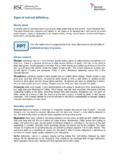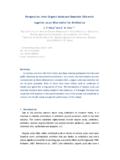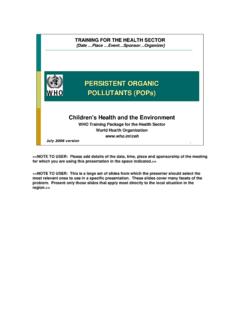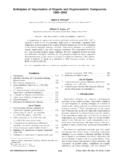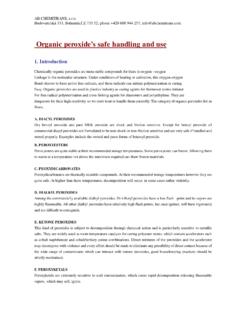Transcription of Organic Electronics for a Better Tomorrow: …
1 Organic Electronics for a Better Tomorrow: Innovation, Accessibility, Sustainability A White Paper from the Chemical Sciences and Society Summit (CS3) San Francisco, California, United States September 2012 Organic Electronics for a Better Tomorrow / 1 Table of Contents About the Chemical Sciences and Society Summit (CS3) .. 2 Foreword: Letter from the 2012 CS3 Chairs .. 3 Executive Summary .. 4 Introduction .. 7 Organic Electronics Today ..10 Organic Electronics : The Vision for Tomorrow .. 14 Research Pathway to the Future.
2 20 Conclusion .. 26 References .. 27 2012 CS3 Participants .. 31 Organic Electronics for a Better Tomorrow / 2 ABOUT THE CHEMICAL SCIENCES AND SOCIETY SUMMIT (CS3) The annual Chemical Sciences and Society Summit (CS3) brings together some of the best minds in chemical research from around the world and challenge them to propose innovative solutions to society s most pressing needs in health, food, energy, and the environment. This unique gathering boasts an innovative format, aiming to set the course of international science, and rotates each year among participating nations.
3 Organic Electronics for a Better Tomorrow: Innovation, Accessibility, Sustainability summarizes the outcomes of the fourth annual 2012 CS3, which focused on Organic Electronics . Thirty top chemists and other scientists from China, Germany, Japan, the United States, and the United Kingdom assembled in San Francisco to identify major scientific and technological research challenges that must be addressed to advance the field of Organic Electronics in a way that best meets societal needs. This white paper presents an international view on how the use of Organic materials in electronic devices can contribute positively to creating a more innovative, accessible, and sustainable electronic world.
4 The CS3 initiative is a collaboration between the Chinese Chemical Society (CCS), German Chemical Society (GDCh), Chemical Society of Japan (CSJ), Royal Society of Chemistry (RSC), and American Chemical Society (ACS). The annual symposia are supported by the National Natural Science Foundation of China (NSFC), German Research Foundation (DFG), Japan Society for the Promotion of Science (JSPS), UK Engineering and Physical Sciences Research Council (EPSRC), and National Science Foundation (NSF). This white paper was prepared by science writer Leslie A.
5 Pray, PhD, in consultation with the American Chemical Society, and reviewed by 2012 CS3 participants. Organic Electronics for a Better Tomorrow / 3 FOREWORD: LETTER FROM THE 2012 CS3 DELEGATION CHAIRS We live in an electronic world. Economic, health, and national security rely on and are positively impacted by electronic technology. However, the resources and methodologies used to manufacture electronic devices raise urgent questions about the negative environmental impacts of the manufacture, use, and disposal of electronic devices.
6 The use of Organic materials to build electronic devices may offer a more eco-friendly -- and affordable -- approach to growing our electronic world. Moreover, and some would say more importantly, Organic small molecules, polymers, and other materials afford electronic structures unique properties impossible to obtain with silicon alone, creating untold potential for novel functionality. However, the field of Organic Electronics is in its infancy with respect to devices on the market. Realizing the vision of Organic Electronics as a more innovative, accessible, and sustainable approach to growing our electronic world will require overcoming key research challenges.
7 Chemists, physicists, and other scientists and engineers engaged in Organic Electronics research representing China, Germany, Japan, the United Kingdom and the United States gathered in San Francisco in September of 2012 to discuss their visions for the future of Organic Electronics and to offer research recommendations for advancing the field in a way that will maximize its potential positive impact on society. Our hope is that our research recommendations will be recognized and considered by science policy-makers worldwide not just in the field of chemistry, but also in the broad range of other scientific and engineering disciplines that impact Organic Electronics research and development.
8 While chemists play a vitally important role in synthesizing and transforming the Organic building block materials that make Organic Electronics possible, our vision for the future will not be realized without the cooperation of physicists and other scientists and engineers from across academia and industry. Xi Zhang Chair, China Delegation Peter B uerle Chair, Germany Delegation Takuzo Aida Chair, Japan Delegation Peter Skabara Chair, United Kingdom Delegation Cherie Kagan Chair, United States Delegation Organic Electronics for a Better Tomorrow / 3 EXECUTIVE SUMMARY Chemists, physicists, and other scientists and engineers are synthesizing and manipulating a wealth of new Organic materials in ways that will change the way society interacts with technology.
9 These new materials create novel properties impossible to replicate with silicon, expanding the world of Electronics in ways unimaginable until now. Organic Electronics for a Better Tomorrow: Innovation, Accessibility, Sustainability examines where Organic Electronics are today, where chemical scientists envision the field is heading, and the scientific and engineering challenges that must be met in order to realize that vision. Already, consumers are using Organic electronic devices, such as smart phones built with Organic light emitting diode (OLED) displays, often without even being aware of the Organic nature of the electronic technology in hand.
10 The Samsung Galaxy line of OLED-based smartphones occupies a major share of the global smartphone market. Potential future applications are enormous and untold. Organic materials are being studied and developed for their potential to build devices with a flexibility, stretchability and softness ( soft Electronics ) not afforded by silicon or any other inorganic materials that is, electronic devices that bend, twist, and conform to any surface. Imagine a smartphone that folds like a map. Devices made with Organic materials also have the potential to interface with biological systems in ways not possible with inorganic materials.


